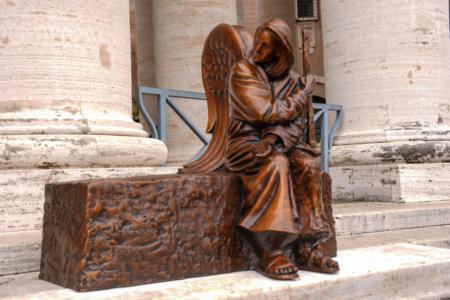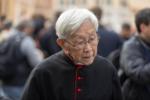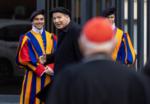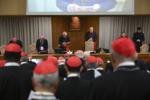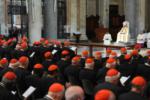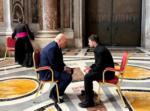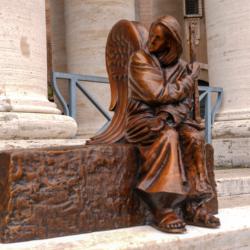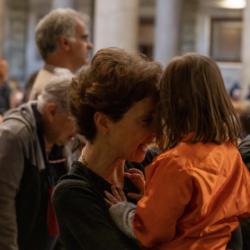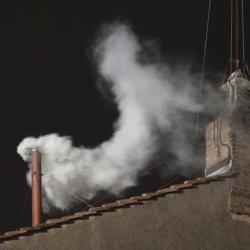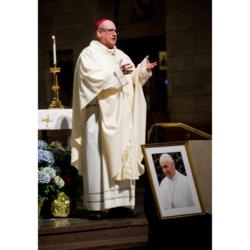Archbishop O’Malley, Bork urge defense of marriage at Red Mass
BOSTON — Archbishop Seán P. O’Malley urged members of the legal profession in Massachusetts to have the courage of St. Thomas More, the patron saint of lawyers, who “lost his life defending the sacredness of marriage.”
Speaking Jan. 11 at the annual Red Mass in the Cathedral of the Holy Cross — a liturgy that invokes blessings on the legal community — the archbishop implored the congregation to “witness to the truth about marriage” and defend traditional marriage in the Commonwealth.
"We live in such an age ...where our courts have undermined the value of life itself and now attempt to dilute the meaning of marriage," Archbishop O'Malley declared. "In diluting the meaning of marriage, we risk diminishing our own humanity."
Archbishop O’Malley went on to say that “part of our mission as disciples of Jesus Christ must be to defend the sacredness of life and the sacredness of marriage.”
Citing the “great influence” that the legal profession has on the development of laws and public policy, the archbishop invited the assembly to “stand with us in defending the institution of marriage.”
By watering down the definition of marriage, he said, the courts risk creating “some new kind of marriage” in which the only criteria is to be “household-sharing domiciles — something akin to carpooling.”
"We need to teach young people that child-rearing and marriage go hand in hand," he said. The archbishop then went on to cite several studies which have proven that children raised in traditional families fare better than those raised in other family units.
Admitting that “the stakes are very high,” he concluded his homily stressing that “we cannot afford to be asleep at the switch. We cannot afford to run for cover. Today, at this Red Mass, I call on you, our Catholic lawyers and jurists, to live your baptismal commitment. Your baptism and your profession invest you with a great responsibility. Use your wisdom and science to defend the truth, to defend marriage. Do it with passion and do what is right.”
At a luncheon following the Mass, sponsored by the Catholic Lawyers’ Guild of Boston, Judge Robert H. Bork, former U.S. Supreme Court nominee and recent convert to Catholicism, also criticized the Supreme Judicial Court’s recent decision granting marriage rights to same-sex couples. Speaking before 325 Catholic members of the legal profession, Bork sought their support in defending traditional marriage.
"When courts forget their role in a democratic society, they take on tasks that are not for them -- and this state has just provided us with a wonderful dramatic example of just that," he stated.
Bork, went on to describe how, when John Adams wrote the Massachusetts constitution, “it seems unlikely that he contemplated any principle which could conceivably create a right to homosexual marriage.”
What the state constitution did create was three different, albeit equally important branches of government, Bork declared, but “by a 4-3 vote, the Massachusetts Supreme Judicial Court decided in Goodridge that the judicial power is also the legislative and the executive power.”
"The state, in that respect, no longer has a government of laws, but one of four lawyers wearing robes," he continued.
Bork expressed dismay at the arguments used by the court to legalize gay marriage, calling them nothing but “vacuous theory ... that did not rise above the quality of a late-night philosophy session in a dormitory.”
"A court majority took this decision from political correctness rather than law," he said. "Goodridge is a decision untethered to the federal or state constitution ... If anything justifies the phrase 'judicial tyranny,' this one does."
According to Bork, the Massachusetts high court is not alone in making decisions which “are just not for the courts to decide.”
"The U.S. Supreme Court is also guilty of judicial sin -- the willingness, even the eagerness to reach results by announcing principles that have no plausible relationship with the Constitution," he said.
"They have turned the First Amendment inside out," continued Bork. "Our Bill of Rights' jurisprudence has less and less to do with the Bill of Rights."
Bork, a former U.S. Attorney General who has authored several books including “Slouching Towards Gomorrah: Modern Liberalism and American Decline,” believes the reason for this “judicial activism” stems from the “radical individualism which borders on nihilism” rampant throughout our country.
According to Bork, absolute truths are no longer acceptable, “the sense of the sacred is withered and virtue in all forms is mocked.”
"Only the individual is allowed to decide what is meaningful to him," he exclaimed.
Bork ended his talk urging the legal profession “to struggle [for the truth] even when the road seems long and the deck is stacked.”
"Our law and our culture are currently in a state of crisis," he concluded.
